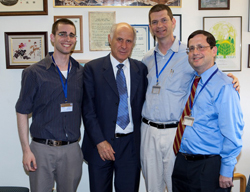Making W3C the Best Place for New Standards Work
In my previous blog entry I discussed the five major focus areas for W3C as an organization. They were:
- Drive a Global and accessible Web
- Provide a Better Value Proposition for Users
- Make W3C the best place for new standards work
- Strengthen our core mission
- Resource alignment to achieve the first four
In this entry I will elaborate on the third priority.
General background
I motivated this priority in my last post. The Web platform is expanding. There is much new innovation and the Web will benefit if the community brings their work to W3C.
A friction point is that for a variety of reasons it takes time to create standards. Can the pace of standardization keep up with the pace of innovation? A number of factors affect the pace of standards development:
- We are dealing with a mature infrastructure
- The expansion of the platform adds a level of complexity
- Implementation rhythms of software developers are very rapid
- We aim for a royalty-free Web. That is a good thing. But it comes with a side-effect; patent portfolio searches by standards participants. This can take some time.
- More people are involved in the decisions.
- More people and groups are effected by the outcome.
- It takes time to build agreement among stakeholders (in a way that supports fairness and accountability)
- W3C is not set up for large numbers of individual developers (from non-Member organizations) to participate
It is clear to us that to make W3C a more friendly place for New Standards we must recognize these issues and come up with approaches to address them.
Not every problem has an easy solution. The first item in the list — growth of complexity — has shown up in other platforms and is not easy to remove.
Also, W3C's robust process is appreciated by most of our stakeholders. So the challenge is to find solutions that allow the robust process when the community calls for it, and to ensure we also have agile, lightweight processes to meet other community needs. This is the challenge that this team has accepted.
Openness of this effort
If we are to be more agile, more open, attracting different stakeholders, this effort needs to start right now. I've set up a task force with a public wiki where you can follow their progress and learn how to contribute.
In particular, right now the task force is interested in hearing about use cases from the community, such as "we're interested in working together on an ontology in my industry" or "we are a few individuals writing a small format specification and would like to share it with the broader community." The task force invites you to discuss your ideas with them on public-vision-newstd@w3.org (publicly archived). The task force will also be using other means of communication that will soon be listed on their home page.
My recent travels
This imperative — the need to be attractive for new Standards work — was confirmed by my travels over the last two weeks to Belgium, Israel, and the UK. I met with many groups; all different in nature. Each in their own way illustrated the excitement around new technologies and new standards. Here are three examples.
In Brussels I met with officials of the EU. There is attention to the EU's framework program, and making the Web more useful for governments and their citizens through the provision of linked open data. This drives new potential standards.
In Holon, I met with the Garage Geeks, an informal group of innovators working in start-ups for a wide range of technologies. In an hour brainstorming session, it was clear that innovation is moving in its usual disruptive fashion — with the Web as a key platform.
And in Herziliya, I gave a keynote address at an IEEE technical conference. Key themes at this conference included cloud computing, media, smart devices, verticals, and high bandwidth infrastructure. Again, showing innovation going in many different directions.

This is great news. As a developer at a small web agency, we are often faced with some difficult technology decisions when it comes to tools. While we do our best to adhere to web standards, in many cases clients request things that are either impossible or prohibitively difficult to do without plug-ins.
I'm looking forward to seeing more agility in the W3C. Hopefully, it won't be long before we have viable, standards-based solutions for rich internet experiences.